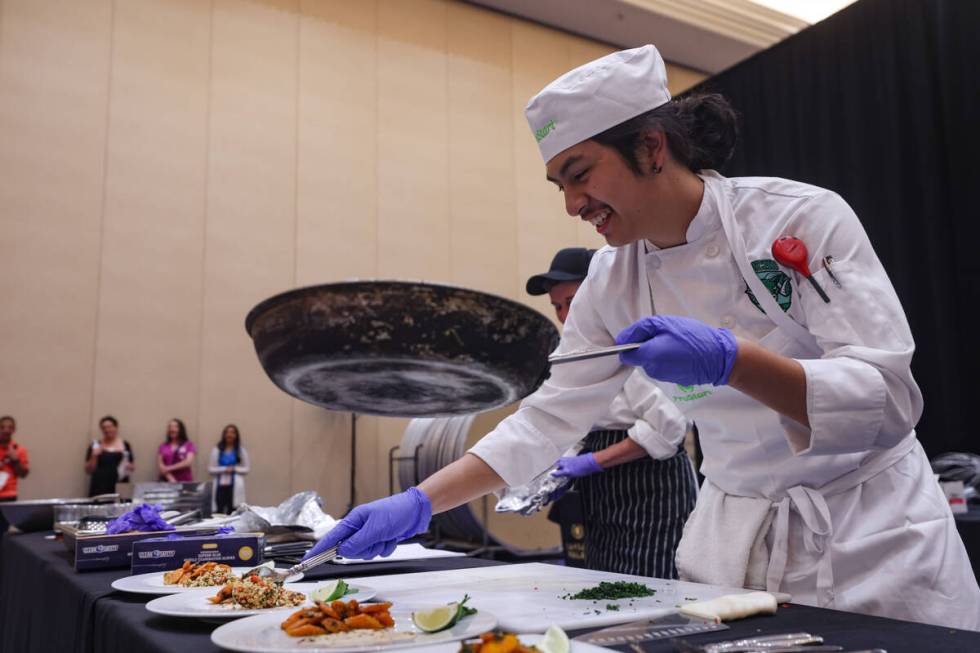Exploring the culinary art of school lunches

Clark County School District students went knife to knife in a cooking competition this week. The goal: create a healthy, delicious meal that costs under $2.
The Monday competition marked the first in a three-day healthy meals summit hosted by the U.S. Department of Agriculture. The gathering at Caesars Palace was the largest federally led event to date in support of school meals, according to Action for Healthy Kids, which cohosted the event. Studies have shown that improving nutrition in school meals leads to better outcomes in academic performance, emotional well-being and attendance, according to the USDA.
“I never thought I would be at an event like this, where our school lunch team is being celebrated as the incredibly professional culinary art that it is,” said USDA Deputy Under Secretary Cindy Long said when she first saw the competition underway.
The competition
Each student partnered with a chef to create a meal from their mystery basket, which contained four different proteins and pantry items such as grains, produce, herbs and spices.
Prinz Villagracia, a student in the culinary program at Rancho High School, took home $500. His high school also will receive $500. Villagracia’s winning recipe — Thai tofu tacos with spicy Mexican carrots — will be posted online and made available to other schools across the country.
Villagracia said the meal was inspired by his work at a Thai restaurant and his Mexican heritage. He first fell in love with cooking when he would help his grandparents growing up. Eventually, he hopes to become a chef.
“Sharing that love with everyone is something I can always carry with me every day,” he told the Las Vegas Review-Journal.
Changing guidelines
Rob Bisceglie, CEO of Action for Healthy Kids, an organization that supports schools as they work on nutrition, said he was particularly impressed by the low budget the students had to meet. Across the board, he said, budgets are the largest obstacle for schools trying to meet healthier guidelines.
In addition to guiding regulations for lunches, Long highlighted the importance of supporting schools as they adjust. The USDA has invested over $13 billion into healthy school lunches and $30 million into small and rural schools this year, she said.
Jake Yarberry, a menu coordinator for CCSD, said the most difficult component of crafting healthy meals is the district’s size. In order to plan for changing regulations for reducing added sugar in 2027, for instance, he has to start now.
Although Nevada no longer has guaranteed universal lunches, the Clark County School District still does.
Throughout the conference, Yarberry hoped to learn from nutritionists across the country who had won awards for their school nutrition.
Funding
Nevada was allocated $644,423 in 2022 in a USDA equipment assistance grant, which is designed to assist schools in providing healthy and appealing menus. That year, 41 sites around the state purchased milk coolers, warming cabinets, refrigerators, ovens and freezers. This past year, the state got just under $80,000.
In 2022 Nevada also received an $850,015 grant toward farm-to-school programming. Garden Farms Foundation, which will work with CCSD to support outdoor edible gardens and implement comprehensive agriculture educational programming, also received under $50,000.
With these healthy initiatives, some students may be worried about the fate of cinnamon rolls, which Yarberry said are particularly popular among students.
While Yarberry could not guarantee the future, he said the district is “really working on it.”
“The cinnamon rolls are a staple of the Clark County School District, so I think we’ll figure it out,” he said.
Contact Katie Futterman at kfutterman@reviewjournal.com.